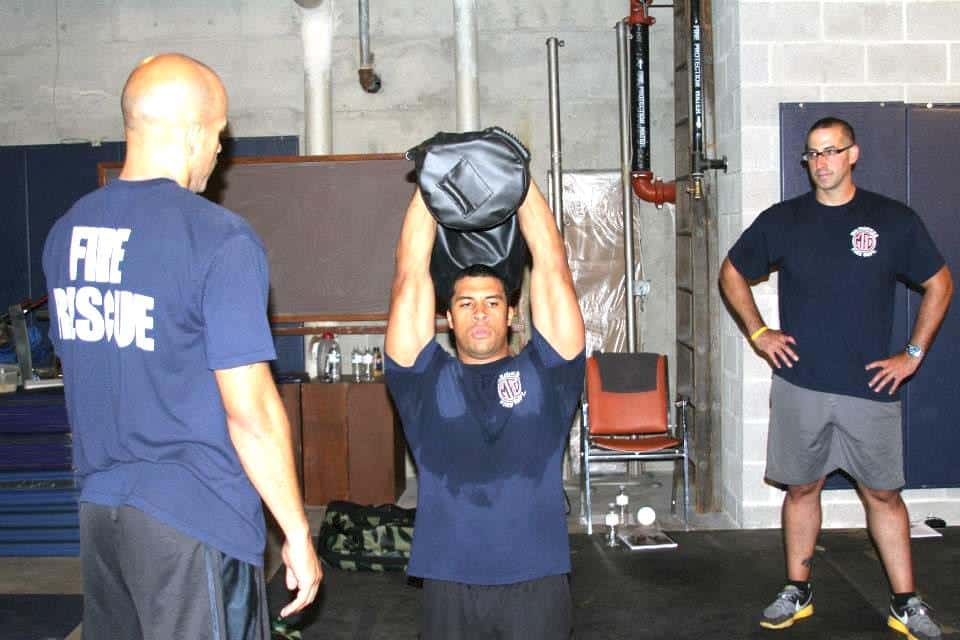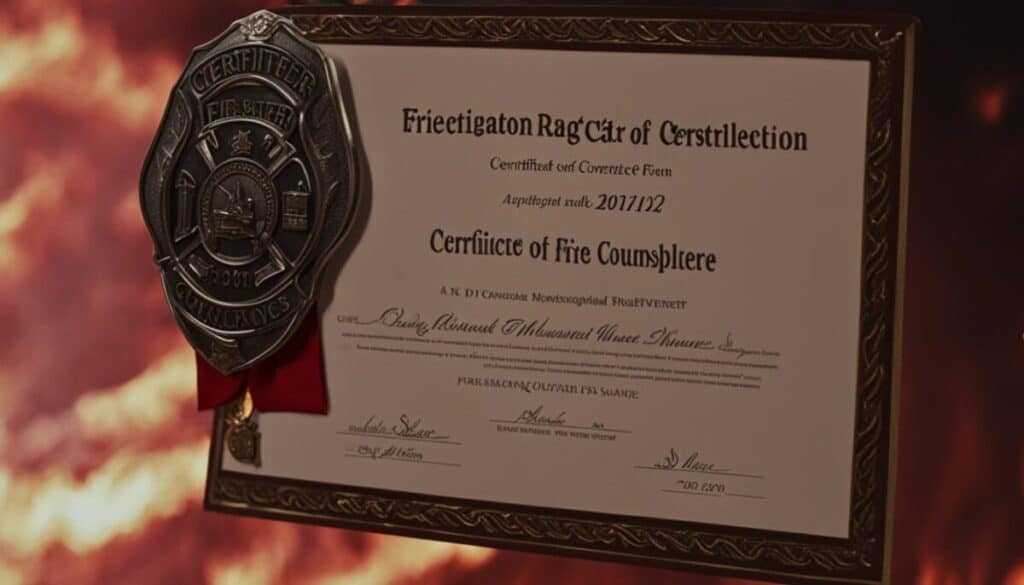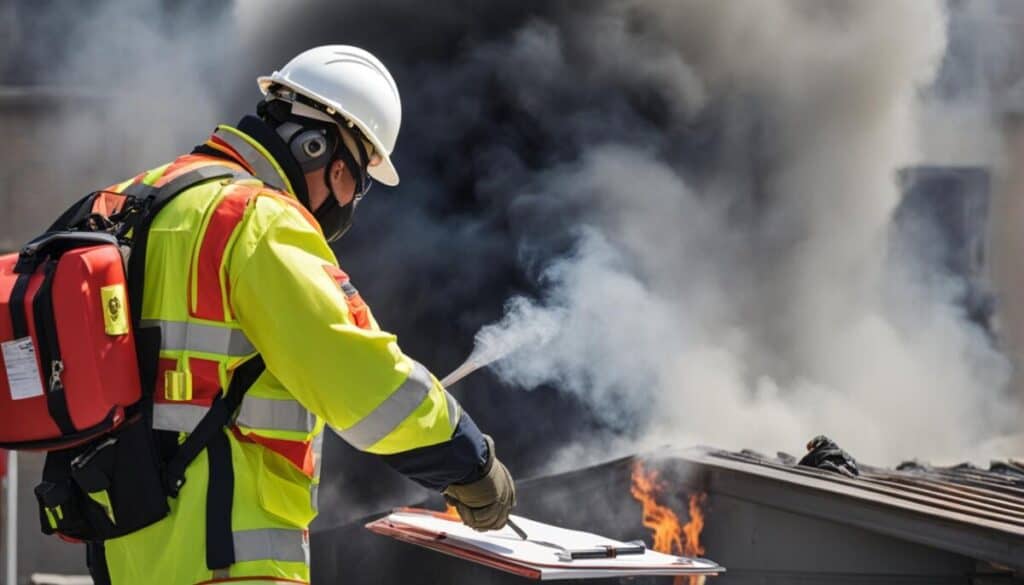
Are you passionate about helping others and making a difference in your community? A career as a firefighter might be the perfect fit for you. Firefighters play a crucial role in protecting lives and property from fires and other emergencies. In this guide, we will explore the steps to becoming a career firefighter and the exciting opportunities that lie ahead.
Key Takeaways:
- Firefighters begin their careers by attending fire academy training.
- Prospective firefighters must pass written and physical tests, complete interviews, and train at a fire academy.
- Continuing education and certifications are important for career advancement.
- A strong set of skills and qualities, including communication and physical stamina, is essential for success in this field.
- To increase your chances of getting hired, consider becoming an EMT, volunteering, and taking fire technology classes.
Education and Training Requirements
To pursue a career as a firefighter, it is essential to meet specific education and training requirements. While a high school diploma or equivalent is the typical entry-level education, additional post secondary instruction and certifications are often necessary for aspiring firefighters. One significant aspect of this educational journey is obtaining the emergency medical technician (EMT) certification. To achieve this certification, individuals need to undergo further instruction in areas such as assessing patients’ conditions, managing trauma, and clearing obstructed airways.
Requirements for EMT certification may vary depending on the city and state. It is crucial to check the specific guidelines in your area to ensure compliance. The EMT certification equips firefighters with the necessary medical knowledge and skills to provide efficient emergency medical services.
Entry-level firefighters undergo comprehensive training at fire academies, either run by the local fire department or the state. During these programs, recruits learn various aspects of firefighting and fire prevention, including techniques, local building codes, and emergency medical procedures. The training typically spans several months and provides a solid foundation for future firefighters.
For those interested in becoming wildland firefighters, apprenticeship programs lasting up to four years are available. These programs offer specialized training in wildland firefighting techniques and provide a deeper understanding of handling fires in natural landscapes.
Furthermore, some firefighters choose to attend federal training sessions sponsored by the National Fire Academy. These sessions provide additional knowledge and expertise in specific areas of firefighting.
Overall, the education and training requirements for firefighters ensure that they are well-prepared to handle emergencies and protect lives and property.
Fire Academy Training Overview
| Training Type | Duration | Skills and Knowledge Covered |
|---|---|---|
| Fire Department or State Fire Academy | Several months |
|
| Wildland Firefighter Apprenticeship | Up to 4 years |
|
| National Fire Academy Training | Varies |
|
Licensing and Certifications
Requirements for Licensure or certification can vary depending on the state or locality. As a firefighter, it may be necessary to obtain specific credentials to perform certain duties and ensure the highest level of professionalism and competency. Two important certifications for firefighters are emergency medical technician (EMT) certification and paramedic certification.
EMT certification is typically a requirement for firefighters as they often provide medical assistance at emergency scenes. The National Registry of Emergency Medical Technicians (NREMT) offers certification to EMTs who have completed a formal training program and passed the national exam. This certification ensures that firefighters have the necessary skills to provide basic medical care in critical situations.
Paramedic certification is a higher level of medical training and allows firefighters to provide advanced medical care. It involves additional coursework, clinical experience, and passing a certification exam to demonstrate proficiency in advanced life support techniques. Paramedic certification is essential for firefighters who are part of specialized rescue teams or work in areas where advanced medical care is needed.
Continuing education is crucial for maintaining these certifications and keeping up-to-date with the latest practices and techniques in emergency medical services. Firefighters must participate in regular training programs and courses to ensure their skills stay current and that they can provide the best possible care to the community they serve.
Aside from medical certifications, firefighters may also be required to have a commercial driver’s license (CDL) or a driver’s license with a firefighter endorsement, depending on the state or locality. This is necessary for operating fire trucks, as they often require specialized training and expertise to safely navigate through traffic and emergency situations.
Requirements for Licensing and Certification:
| Certification | Description |
|---|---|
| EMT Certification | Required for firefighters to provide basic medical care at emergency scenes. |
| Paramedic Certification | Allows firefighters to provide advanced medical care and participate in specialized rescue teams. |
| CDL or Firefighter Endorsement | Required for operating fire trucks and ensuring the safe transportation of equipment and personnel. |
Obtaining the necessary certifications and licenses is an important step in becoming a professional firefighter. These credentials ensure that firefighters are well-equipped to handle the diverse challenges they may face and provide the best possible care to those in need.

Employment Requirements
Applying to become a firefighter requires meeting specific qualifications and successfully navigating the hiring process. Here’s what you need to know:
Firstly, you must be at least 18 years old and possess a valid driver’s license. These requirements ensure that firefighters have the legal ability to operate emergency vehicles and fulfill their duties effectively.
Before being hired, applicants are required to undergo a thorough medical exam to assess their physical fitness and overall health. This examination ensures that firefighters can handle the demanding physical challenges they may encounter on the job. Additionally, a drug screening is conducted to maintain a drug-free work environment.
Once hired, firefighters may be subject to random drug tests to ensure their continued adherence to the organization’s policies. Routine physical fitness assessments are also conducted to monitor the overall fitness levels of firefighters and ensure they can perform their duties at a high level.
To support your journey towards becoming a career firefighter, consider gaining experience as a volunteer firefighter. Volunteering not only provides valuable hands-on experience but also demonstrates your commitment to the role and can significantly improve your chances of being hired.
Overview of Employment Requirements
| Requirement | Description |
|---|---|
| Minimum Age | At least 18 years old |
| Driver’s License | Valid driver’s license |
| Medical Exam | Physical fitness assessment Overall health evaluation |
| Drug Screening | Testing for substance abuse |
| Random Drug Tests | Ongoing drug screenings |
| Physical Fitness Assessments | Routine evaluations of fitness levels |
Volunteering as a firefighter can be a valuable stepping stone on your journey towards a career in firefighting.
Advancement and Career Opportunities
As a firefighter, there are various opportunities for career advancement and growth. With dedication, experience, and additional qualifications, firefighters can progress to higher ranks within the fire service. Some of the ranks individuals can aspire to include engineer, lieutenant, captain, battalion chief, assistant chief, deputy chief, and ultimately, chief.
To increase your chances of moving up the ranks, it is beneficial to acquire a bachelor’s degree, preferably in fire science, public administration, or a related field. While not mandatory for all fire departments, having a higher education can demonstrate your commitment to the profession and enhance your knowledge and skills.
In addition to climbing the hierarchical ladder, firefighters can also explore alternative career paths within the fire service. One such option is to become a fire inspector or investigator. Fire inspectors play a crucial role in preventing fires by conducting inspections, enforcing fire codes, and investigating fire incidents. This role requires a comprehensive understanding of fire safety regulations and excellent attention to detail.
Image:

To support career advancement in the fire service, there are numerous opportunities for continuing education and professional development. Firefighters can participate in specialized training programs, workshops, and conferences to stay updated with the latest firefighting techniques, technologies, and regulations. These initiatives not only expand your knowledge base but also demonstrate your commitment to personal and professional growth.
By continuously investing in your education, skills, and experience, you can position yourself for long-term success and open doors to exciting career opportunities within the fire service.
Important Skills and Qualities
Being a firefighter requires a unique set of skills and qualities that are essential for success in this demanding profession. Whether it’s responding to emergency situations, providing support to those in distress, or making split-second decisions, firefighters must possess a range of abilities to effectively carry out their duties. Here are some of the key skills and qualities that make a firefighter exceptional:
Communication Skills
One of the most crucial skills for firefighters is effective communication. Whether it’s coordinating efforts with other team members, providing instructions to civilians during emergencies, or communicating with dispatchers, clear and concise communication is vital. Firefighters must be able to convey information quickly and accurately, ensuring that everyone involved is on the same page and able to respond effectively.
Compassion
Firefighters frequently encounter people who are experiencing life-threatening situations or traumatic events. In these instances, compassion is an essential quality that allows firefighters to provide emotional support and comfort to those in distress. Showing empathy and understanding can make a significant difference in reassuring individuals and helping them cope during challenging times.
Decision-Making Skills
Firefighters often find themselves facing critical decisions in high-pressure situations where quick thinking can mean the difference between life and death. Strong decision-making skills are essential to assess rapidly evolving circumstances, prioritize tasks, and determine the most effective course of action. Firefighters must be able to remain calm under pressure and make sound judgments to protect themselves and others.
Mental Preparedness
The firefighting profession can be highly stressful and demanding. Firefighters must possess mental preparedness to handle the physical and emotional challenges that come with the job. This quality allows them to stay focused, maintain composure, and effectively navigate stressful situations with resilience and determination.
Physical Stamina and Strength
Firefighters face physically demanding tasks, such as carrying heavy equipment, climbing ladders, and performing search and rescue operations. Physical stamina and strength are essential to endure long hours at disaster scenes and complete strenuous tasks while ensuring the safety of themselves and others. Regular physical fitness training helps firefighters maintain their endurance and strength.
By combining these skills and qualities, firefighters are equipped to tackle the challenging and dynamic nature of their profession, providing vital services to their communities and ensuring public safety.
Steps to Increase Your Chances of Getting Hired
So, you’re interested in becoming a firefighter? Taking the necessary steps to increase your chances of getting hired is crucial. Here are some key actions you can take:
- Become an EMT: Obtaining certification as an Emergency Medical Technician (EMT) can significantly enhance your chances of securing a firefighting job. EMTs provide critical medical care in emergency situations, making this certification highly relevant to the role.
- Volunteer your time: Volunteering as a firefighter not only allows you to gain valuable experience but also demonstrates your commitment to the profession. Look for opportunities to join local fire departments or organizations and actively participate in their operations.
- Take fire technology classes: Enrolling in fire technology classes can provide you with essential knowledge and skills relevant to firefighting. These courses cover topics such as fire behavior, prevention, and suppression techniques.
- Maintain a clean background and lifestyle: Fire departments prioritize individuals with a clean background and a dedication to maintaining a healthy lifestyle. Ensure your personal conduct aligns with the high standards expected of firefighters.
- Understand all phases of the firefighter hiring process: Familiarize yourself with the firefighter hiring process in your area. Research and understand the different stages, requirements, and assessments involved to better prepare yourself for each step.
- Start taking firefighter tests: Practice firefighter tests to improve your performance and readiness. These tests typically assess your physical abilities, cognitive aptitude, and problem-solving skills.
- Visit fire stations: Actively engage with local fire stations, speak to firefighters, and learn more about the profession firsthand. This will not only help you gain insight but also enable you to establish valuable connections within the firefighting community.
- Gain life experience: Building a diverse range of life experiences can contribute to your overall growth and skill set as a firefighter. Participate in activities that foster teamwork, leadership, and resilience.
- Prepare for the background investigation: Fire departments conduct comprehensive background investigations to ensure the suitability of candidates. Be prepared to provide accurate and detailed information about your personal and professional history.
By following these steps, you can increase your chances of standing out during the firefighter hiring process and ultimately achieving your goal of becoming a firefighter.
| Benefits of Taking These Steps | Actions to Take |
|---|---|
| Enhanced qualifications and skills | Become an EMT Volunteer your time Take fire technology classes |
| Higher chances of passing the hiring process | Maintain a clean background and lifestyle Understand all phases of the firefighter hiring process Start taking firefighter tests |
| Stronger network and connections within the firefighting community | Visit fire stations Engage with firefighters |
| Well-rounded qualifications through diverse life experiences | Gain life experience Participate in activities fostering teamwork, leadership, and resilience |
What are the education and training requirements to become a firefighter?
To become a firefighter, you typically need a high school diploma or equivalent. Additional post secondary instruction in emergency medical services, such as obtaining an EMT certification, may also be needed. Firefighters receive training at fire academies and may attend apprenticeship programs for wildland firefighting.
What certifications and licenses do firefighters need?
Firefighters may need certifications such as emergency medical technician (EMT) and paramedic certifications. The National Registry of Emergency Medical Technicians (NREMT) certifies EMTs and paramedics. Depending on the state or locality, firefighters may also need a commercial driver’s license (CDL) or driver’s license with a firefighter endorsement to operate a firetruck.
What are the employment requirements for firefighters?
Applicants for firefighter jobs must typically be at least 18 years old and have a valid driver’s license. They must pass a medical exam and drug screening. After being hired, firefighters may be subject to random drug tests and routine physical fitness assessments. Volunteering as a firefighter can be helpful in gaining experience and improving chances of being hired as a career firefighter.
What are the advancement and career opportunities for firefighters?
Firefighters can be promoted to higher ranks such as engineer, lieutenant, captain, battalion chief, assistant chief, deputy chief, and chief. Some fire departments may require candidates for higher positions to have a bachelor’s degree in fire science, public administration, or a related field. Firefighters can also choose to become fire inspectors or investigators after gaining enough experience. Continuing education and professional development opportunities are available for career advancement.
What are the important skills and qualities for firefighters?
Firefighters need communication skills to effectively communicate at emergency scenes and compassion to provide emotional support. Decision-making skills are essential for making quick decisions in life-or-death situations. Mental preparedness is necessary to handle job stress, and physical stamina and strength are required for demanding tasks at disaster scenes.
How can I increase my chances of getting hired as a firefighter?
To increase your chances of getting hired as a firefighter, it is recommended to become an EMT, volunteer your time, take fire technology classes, maintain a clean background and lifestyle, understand all phases of the firefighter hiring process, start taking firefighter tests, visit fire stations, gain life experience, and prepare for the background investigation.
Good luck to you in the presuit of becoming a career firefighter.
